Overview
Weight loss is crucial for enhancing overall health and well-being, primarily achieved through a clear understanding of energy balance and the creation of a calorie deficit via dietary modifications and increased physical activity. This article underscores that even modest weight reductions can lead to substantial health benefits, both physically and mentally. It outlines various strategies, including:
- Personalized coaching
- Support systems
Aimed at empowering individuals to succeed in their weight loss journeys.
Introduction
In a world increasingly attuned to the significance of health and fitness, weight loss emerges as a pivotal journey that transcends mere aesthetics. It intricately connects with overall well-being, influencing both physical and mental health. Research highlights that even modest weight reductions can yield substantial health benefits, underscoring the necessity of comprehending the complex relationship between energy balance, dietary choices, and exercise.
As individuals navigate this challenging terrain, they encounter a myriad of strategies, emotional hurdles, and the essential support of networks. This article explores the multifaceted dimensions of weight loss, offering insights and practical approaches that empower individuals to embark on transformative journeys toward enhanced health and vitality.
Understanding the Basics of Weight Loss
Weight reduction fundamentally hinges on the principle of energy balance, which refers to the relationship between calories consumed and calories burned. To achieve weight loss, individuals must create a calorie deficit, meaning they consume fewer calories than their body expends. This can be accomplished through dietary modifications, increased physical activity, or a combination of both approaches.
In 2025, understanding this principle is more critical than ever, especially as occupational physical activity has declined by an average of about 142 kcal/day since 1960. This decline underscores the necessity for individuals to be proactive in managing their energy balance. The physical environment significantly impacts behavior and lifestyle choices related to obesity, making it essential for organizations to foster a supportive atmosphere for health.
Real-world examples of effective calorie deficit strategies include:
- Meal planning
- Portion control
- Incorporating more physical activity into daily routines
Nutritionists emphasize that a sustainable calorie deficit can be achieved by focusing on nutrient-dense foods that provide satiety without excessive calories.
Current statistics reveal that maintaining an energy balance is essential for effective management of body composition. For example, people with low energy throughput are at a greater risk for gaining pounds, as emphasized in the case study on high energy flux and appetite regulation. This study demonstrates that when energy intake aligns more closely with energy expenditure, individuals can better regulate their appetite and maintain a healthy body composition.
Expert opinions in 2025 reinforce the significance of understanding energy balance for loss of mass. As mentioned by prominent nutritionist James O. Hill, "Teaching those skills to individuals, especially to children, could provide them with improved tools to be active participants in managing their own body mass." This highlights the significance of informing individuals about calorie deficits and energy expenditure to effectively manage their body mass.
Moreover, Foresight Health Coaching's transformative wellness coaching app offers a hybrid platform that provides personalized workouts, nutrition guidance, and daily programming, empowering users to achieve their wellness goals efficiently. This hybrid coaching platform ensures that users have a comprehensive wellness solution right in their pocket, making their journey to a healthier lifestyle more convenient and accessible than ever before. The app also facilitates direct messaging with coaches for personalized support and fosters community engagement for motivation.
By incorporating corporate wellness initiatives that focus on energy balance, organizations can assist employees in reaching their health and fitness objectives.
In summary, understanding the fundamentals of energy balance and calorie deficit is essential for anyone starting a reduction journey. By combining dietary adjustments with enhanced physical activity, individuals can establish a sustainable route toward their goals for weight loss for dummies.
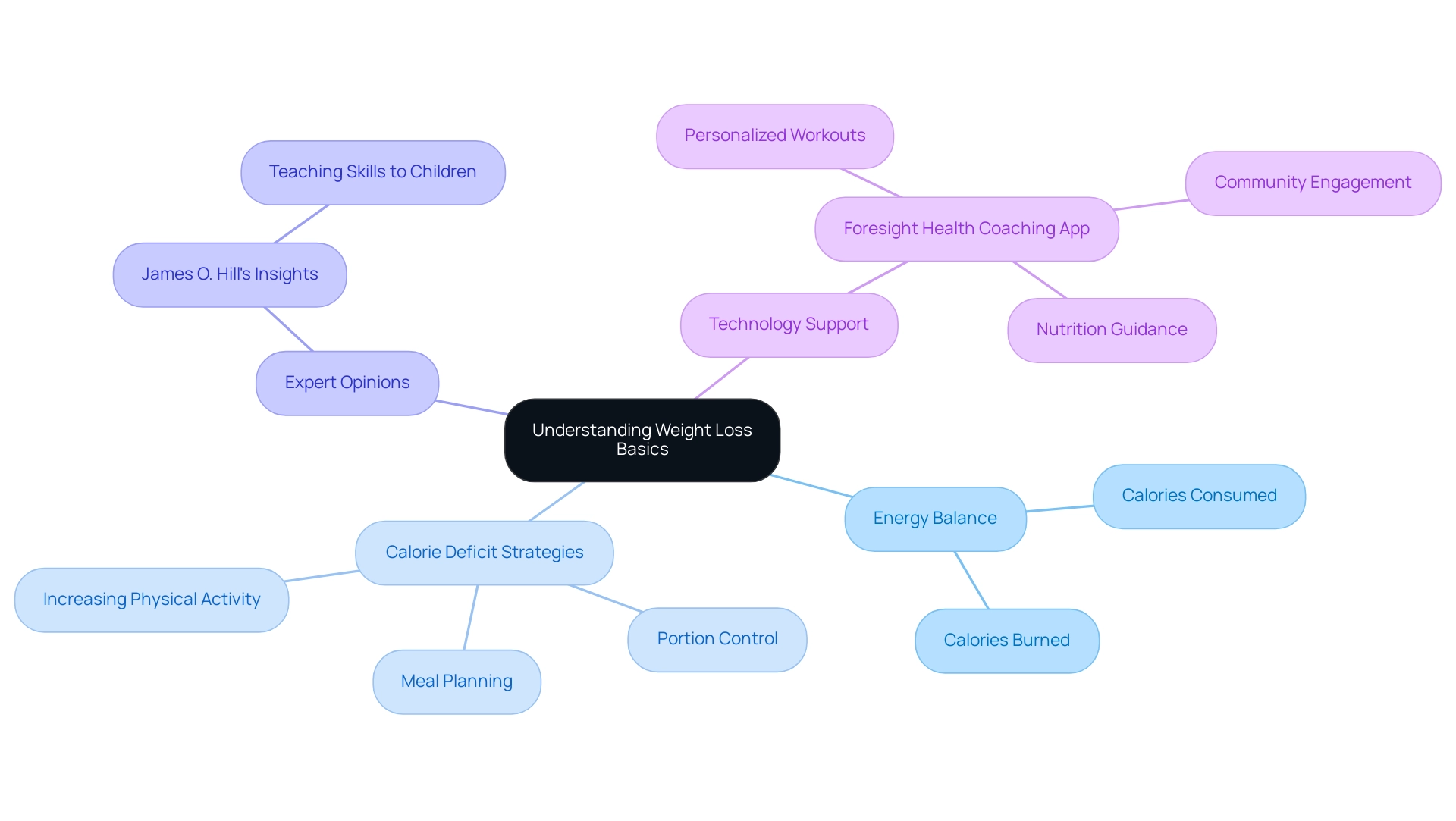
The Importance of Weight Loss for Health and Well-being
Shedding pounds transcends mere appearance; it is crucial for enhancing overall wellness and vitality. Studies indicate that even a modest reduction of 5-10% can yield significant advantages for well-being, including lower blood pressure, improved cholesterol levels, and a decreased likelihood of developing type 2 diabetes. These changes extend beyond the physical realm, profoundly impacting mental health.
Individuals who achieve a decrease in body mass often report enhanced self-esteem and a reduction in symptoms associated with anxiety and depression.
Personalized coaching is instrumental in this journey. Experienced coaches offer tailored support and guidance, empowering individuals to make lasting lifestyle changes. For example, a study revealed that employees engaging in regular physical activity, such as exercising for at least 30 minutes three times a week, report elevated motivation levels at work.
This correlation underscores the importance of reducing mass and fitness in fostering a positive mental state, which can enhance workplace performance. Notably, employees who exercise regularly tend to produce higher quality work, experience reduced fatigue, and enjoy improved mood.
Moreover, the significance of reducing body mass is further supported by ongoing advancements in obesity management. Anticipated recommendations from the Lancet Commission on obesity diagnostic standards are expected to enhance understanding of weight reduction's impact on well-being, potentially reshaping clinical strategies and payer coverage. As Johnny Franco, MD, stated, 'The fact that these have aided in stabilizing obesity is significant,' underscoring the essential role of managing body mass in overall health.
Additionally, with the hiring for the Healthy Living BEYOND Study set to commence in 2025, there is an optimistic outlook on research related to body mass reduction and its effects on wellness advancements. This evolving landscape emphasizes the importance of even slight reductions in mass for wellness benefits.
In summary, the benefits of weight reduction are extensive, encompassing both physical and mental dimensions. By recognizing these advantages and engaging in personalized coaching, individuals can find the motivation to achieve their fitness goals, ultimately leading to a healthier, more fulfilling life as outlined in 'Weight Loss for Dummies'. Contact Corporate Membership - Contact Our Health Coaches Today to embark on your journey towards better health and well-being!
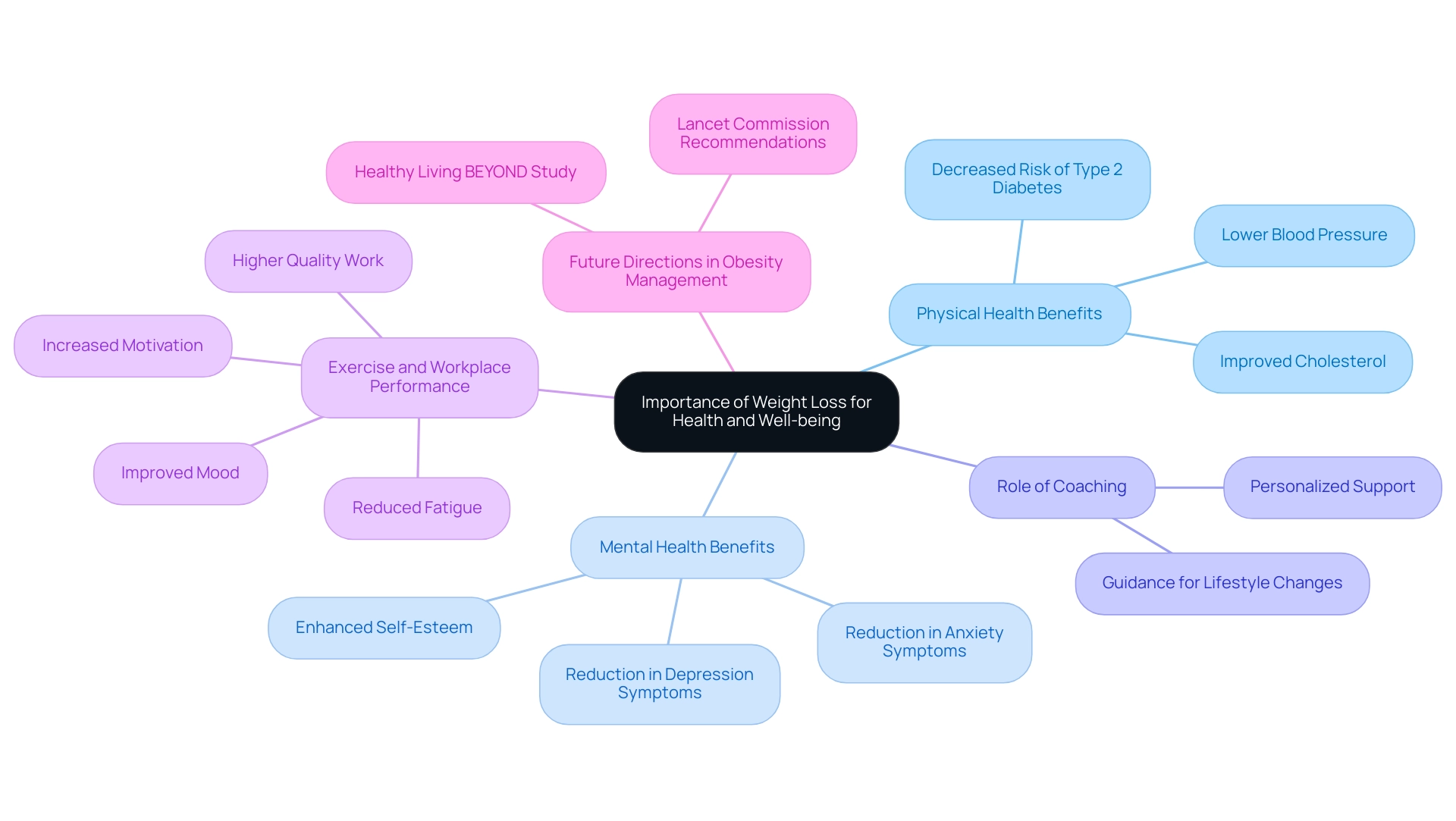
Practical Strategies for Successful Weight Loss
Achieving effective weight loss necessitates a comprehensive method that includes dietary adjustments, physical exercise, and behavioral modifications. Here are key strategies to consider:
-
Setting Realistic Goals: Establishing achievable targets for reducing body mass is crucial for sustaining motivation. Research shows that individuals who establish specific, measurable objectives are more likely to succeed in their journey to reduce body mass. Notably, 52% of middle-aged adults are actively trying to reduce their size, highlighting the importance of effective strategies.
-
Balanced Diet: Prioritize whole foods, including fruits, vegetables, lean proteins, and whole grains, while reducing the intake of processed foods. A balanced diet not only aids in reducing body mass but also improves overall health, with studies indicating that a nutritious diet can result in a 20% boost in success rates for slimming. Foresight Health Coaching offers nutritional guidance as part of its tailored programs, ensuring clients receive personalized advice to optimize their dietary choices.
-
Regular Exercise: Aim for at least 150 minutes of moderate-intensity exercise weekly, incorporating both aerobic and strength training activities. Consistent physical activity is associated with enhanced mood and energy levels, which can further encourage adherence to weight loss plans. Foresight Health Coaching provides fitness coaching customized to individual needs, helping clients integrate effective exercise routines into their lifestyles.
-
Mindful Eating: Cultivating awareness of hunger cues and portion sizes can help prevent overeating. Mindful eating practices have been demonstrated to lower calorie consumption by as much as 25%, making it an effective strategy for managing body composition. Workshops offered by Foresight Health Coaching include sessions on mindful eating, equipping participants with strategies to enhance their relationship with food.
-
Tracking Progress: Utilizing food diaries or mobile apps to monitor dietary intake and physical activity can reveal patterns and highlight areas for improvement. This practice has been linked to a 50% rise in success rates for reducing body mass among users. Foresight Health Coaching promotes the use of its wellness app, which assists clients in tracking their progress and staying connected with their objectives.
Incorporating these strategies can significantly enhance the likelihood of achieving and maintaining weight loss. As the landscape of weight management evolves, tools such as wearable fitness technology are emerging to provide accurate insights into physical activity, sleep, and well-being, further enhancing the effectiveness of these strategies. Additionally, the case study titled "The Influence of AI on Weight Loss" illustrates how artificial intelligence can provide personalized diet and exercise recommendations, emphasizing that while AI serves as a valuable support tool, it is most effective when combined with expert guidance.
As noted, "It’s essential to remember that AI is a support tool, not a magic solution."
For HR Benefits Managers, implementing these strategies within workplace wellness programs can foster a culture of well-being and unity, aligning with Foresight Health Coaching's mission to enhance team wellness and productivity through tailored services. Our corporate memberships accommodate up to 30 employees and feature in-person wellness talks, comprehensive pantry services, and access to our exclusive wellness app. Reach out to Foresight Health Coaching today to discover more about how we can assist your organization’s wellness objectives.
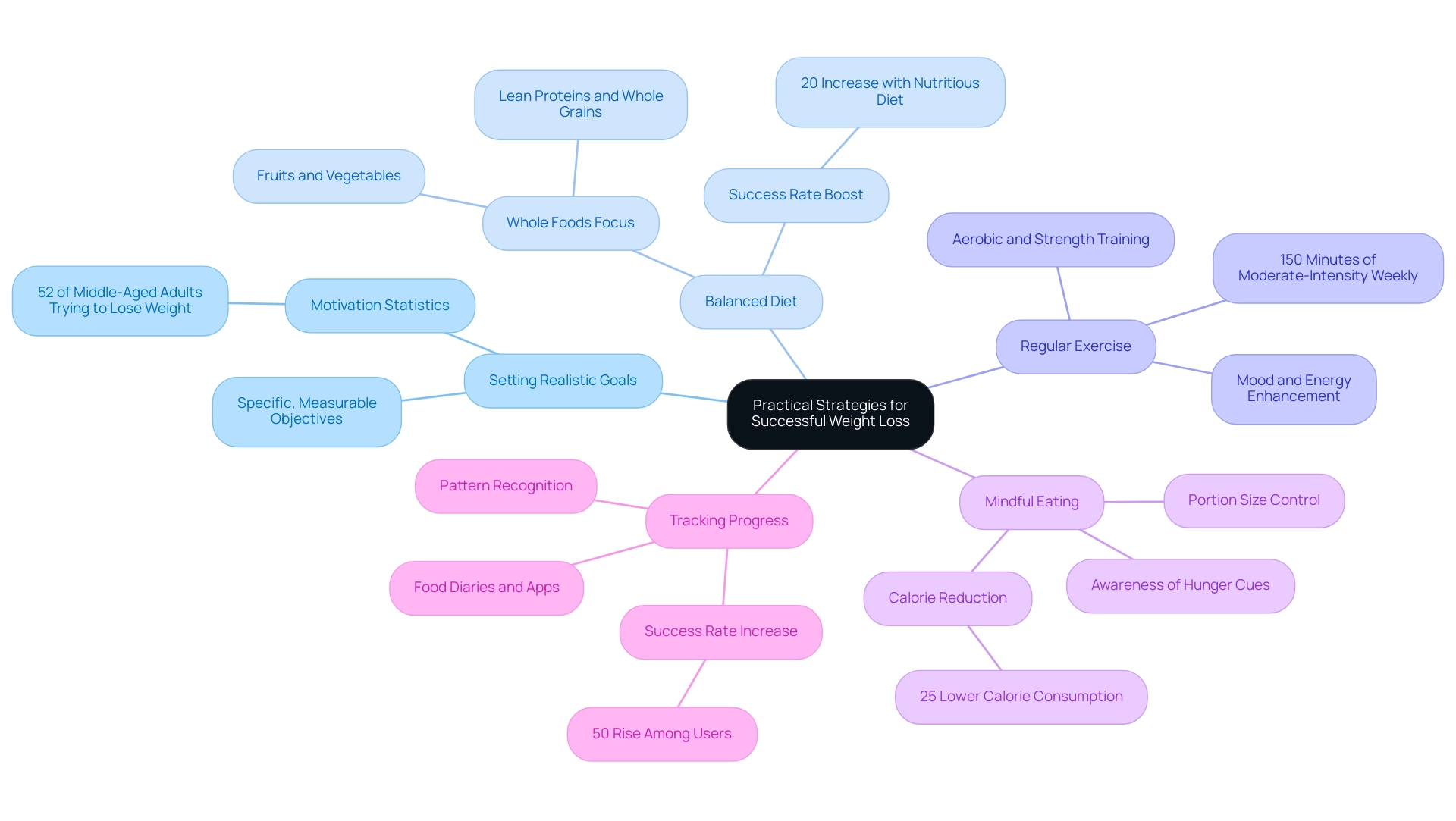
Mental Health and Weight Loss: The Emotional Journey
The journey of reducing body mass is often accompanied by a spectrum of emotions, from excitement and motivation to frustration and disappointment. Recognizing the profound impact of mental well-being on success in body mass reduction is essential. Emotional eating, stress, and anxiety can significantly impede progress, whereas a positive mental state can bolster motivation and commitment to weight loss plans.
Research reveals that emotional eating poses a common challenge, with fewer than half of individuals with bulimia nervosa ever seeking treatment for their eating disorder. This underscores the importance of addressing emotional factors in managing body mass. In 2025, it was identified that management services should screen for emotional eating to tailor interventions effectively to individual needs, highlighting the necessity of personalized support.
Moreover, the overall lifetime prevalence of eating disorders stands at 8.6% among women and 4.07% among men, further emphasizing the urgent need for awareness and tailored support.
To navigate the emotional landscape of reducing body mass, consider the following strategies:
- Seeking Professional Support: Engaging with therapists or counselors provides essential tools to tackle emotional challenges and develop healthier coping mechanisms.
- Building a Support Network: Surrounding oneself with supportive friends and family fosters encouragement and accountability, which are vital for maintaining motivation.
- Practicing Self-Compassion: Being kind to oneself during setbacks cultivates resilience and prevents discouragement, allowing for a more sustainable journey toward achieving a healthier body.
Real-life examples illustrate the effectiveness of emotional support in the pursuit of a healthier body. Individuals who actively participate in support groups or therapy often report higher success rates in managing emotional eating and achieving their body mass reduction goals. Furthermore, integrating self-directed and external regulation methods has proven effective in managing emotional eating and is a key aspect of successful weight loss.
By addressing the emotional elements of weight loss, individuals can create a more sustainable and positive experience, ultimately leading to enhanced mental wellness and well-being. The unique challenges faced by specific demographics, such as transgender youth, also illuminate the critical need for tailored support in addressing eating disorders and emotional eating.
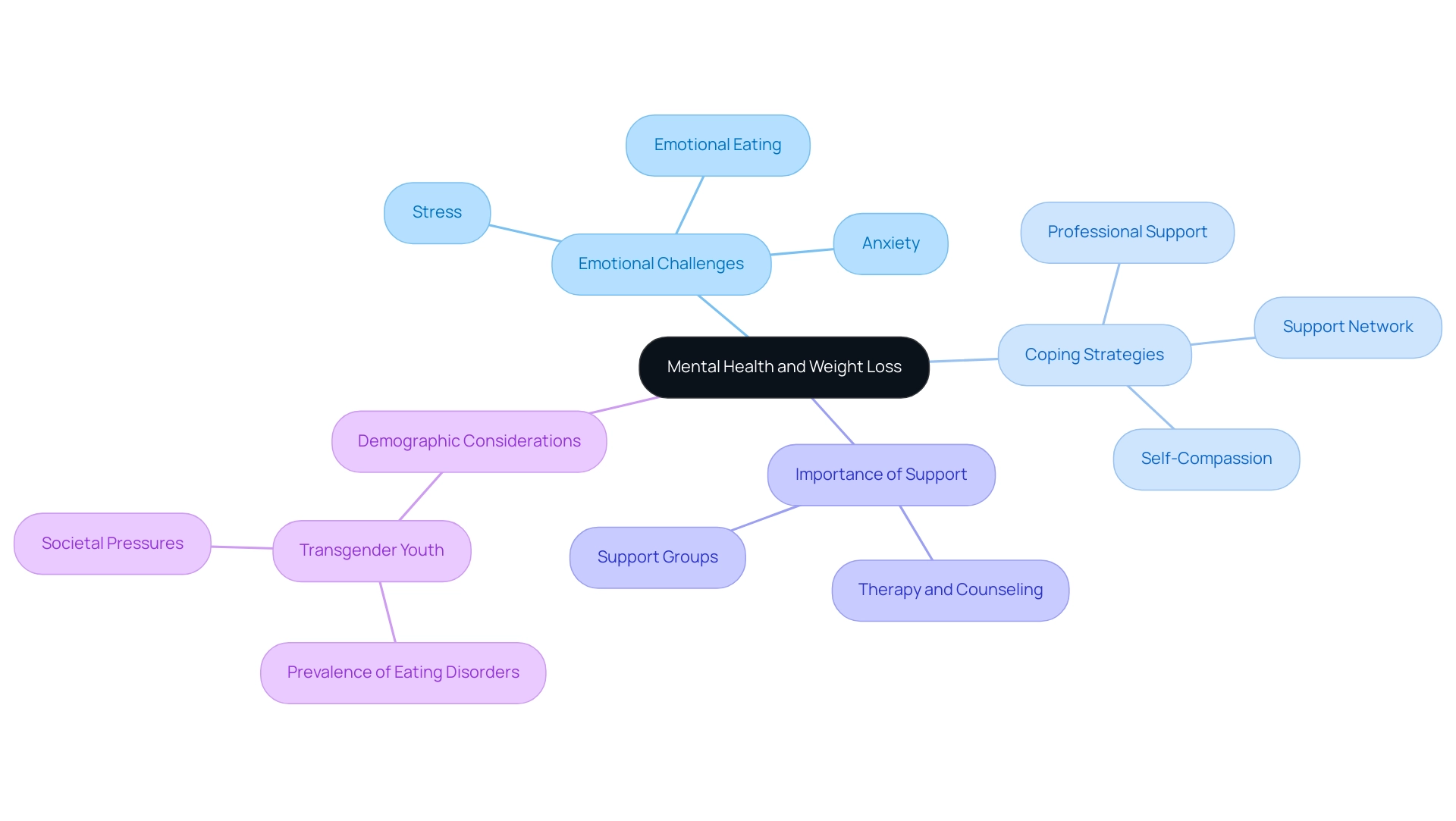
Dietary Approaches: Finding the Right Fit for Weight Loss
Numerous dietary methods exist for weight loss, each providing unique principles and advantages suited to personal requirements. Among the most popular diets are:
-
Mediterranean Diet: Emphasizing whole foods, healthy fats, and lean proteins, this diet promotes heart health and sustainable weight loss. Research indicates that adherence to the Mediterranean diet can significantly reduce the risk of specific cancers, such as colorectal and kidney cancers, owing to its focus on fruits, vegetables, whole grains, and fish. The advantages arise from the mix of different foods instead of separate nutrients, making it an appealing choice for individuals seeking to enhance their eating habits for slimming or general well-being.
-
Low-Carbohydrate Diets: These diets prioritize reducing carbohydrate intake, encouraging the body to utilize fat as its primary fuel source. Recent studies indicate that low-carbohydrate diets have sustained high success rates for reducing body mass in 2025, attracting individuals pursuing quick outcomes.
-
Plant-Based Diets: Concentrating on the intake of fruits, vegetables, legumes, and whole grains, plant-based diets can result in weight reduction and enhanced wellness indicators. Nutritionists often advocate for these diets due to their holistic health benefits and sustainability.
-
Intermittent Fasting: This approach involves alternating between periods of eating and fasting, effectively reducing calorie intake and promoting fat loss. Many individuals find this method aligns well with their lifestyles, making it a popular choice.
In the context of workplace wellness, Corporate Membership - Contact Our Health Coaches Today emphasizes the importance of integrating these dietary approaches into a broader strategy for enhancing employee well-being and productivity. Our wellness coaching app offers a convenient solution by providing all the tools and resources required in one location, including personalized workouts, nutrition guidance, and daily programming to assist employees in staying on track with their wellness objectives. The daily programming feature ensures that users can easily access their personalized workouts, lessons, and nutrition guidance whenever and wherever they are.
Studies have shown that employees who exercise for at least 30 minutes three times per week are more likely to report feeling motivated at work, underscoring the significance of physical activity alongside healthy eating.
As mentioned by Chien, "The report is intended to give individuals a foundation when considering enhancements to their diet, whether for slimming or other wellness purposes." Choosing the appropriate dietary strategy is essential for effective weight loss, as it depends on individual preferences, lifestyle, and medical conditions. It is crucial to choose a plan that is not only effective but also sustainable and enjoyable, ensuring long-term success.
By investing in tailored corporate wellness programs, organizations can improve employee performance, creativity, and stress management, leading to higher quality work and a more cohesive team culture.
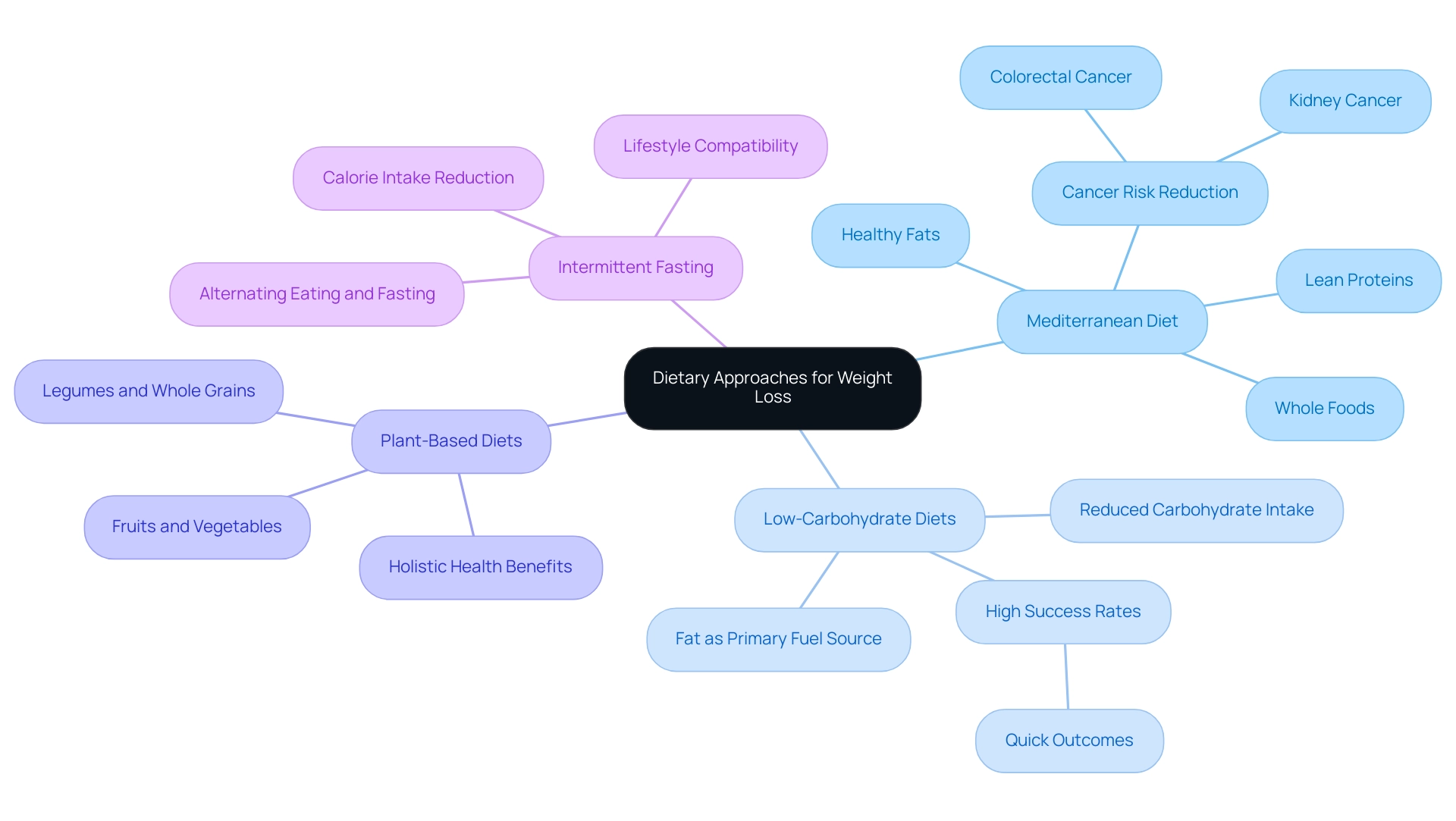
The Role of Exercise in Weight Management
Exercise is a crucial component of any effective strategy for reducing body mass, serving not only to burn calories but also to improve overall health and well-being. Regular physical activity can lead to several significant benefits:
- Increased Metabolism: Engaging in exercise elevates metabolic rate, enabling the body to burn more calories even during periods of rest. This metabolic boost is crucial for effective body management.
- Muscle Preservation: Incorporating strength training into a fitness regimen is vital for maintaining lean muscle mass during reduction. Preserving muscle is essential for long-term success, as it helps sustain a higher metabolic rate.
- Improved Mood: Physical activity triggers the release of endorphins, which can elevate mood and alleviate stress. This psychological advantage is crucial in assisting people stick to their slimming programs.
- Enhanced Productivity: Employees who participate in regular exercise often report increased energy levels and improved focus at work. This heightened productivity not only contributes to better job performance but also fosters a more positive workplace environment.
Studies show that 94% of people who successfully shed pounds boost their physical activity, frequently by walking more. This statistic underscores the importance of workplace exercise programs, which have demonstrated a reduction in absenteeism and presenteeism while simultaneously enhancing employee satisfaction and positive emotions. By incorporating a balanced combination of aerobic and strength training activities into a weekly regimen, people can significantly enhance their weight loss efforts and overall wellness results.
As we approach 2025, the global wellness initiative aims for a 10% reduction in physical inactivity, highlighting the urgent need for organizations to prioritize employee well-being. Investing in fitness programs, such as those provided by Foresight Health Coaching, not only supports individual well-being but also contributes to a more cohesive and resilient team culture. As A’Naja M. Newsome, PhD, ACSM-CEP, EIM, states, "Fitness goals are more than just quality exercise programming; it requires a whole-person approach to change behaviors and mindset."
This comprehensive approach is essential for fostering a healthier workforce.
Furthermore, case studies on the benefits of workplace exercise programs reveal specific outcomes, such as increased productivity and improved employee morale, reinforcing the argument for implementing such initiatives in organizations. By acknowledging that the most prevalent approaches for reducing mass involve both physical activity and dietary modifications, companies can develop a comprehensive wellness plan that encourages enduring wellness advantages. Foresight Wellness Coaching provides corporate memberships that feature in-person wellness talks, comprehensive pantry and nutrition services, and access to our wellness app, ensuring that employees have the resources they need to succeed in their journeys.
For more information on our services, please refer to our user manuals and FAQs.
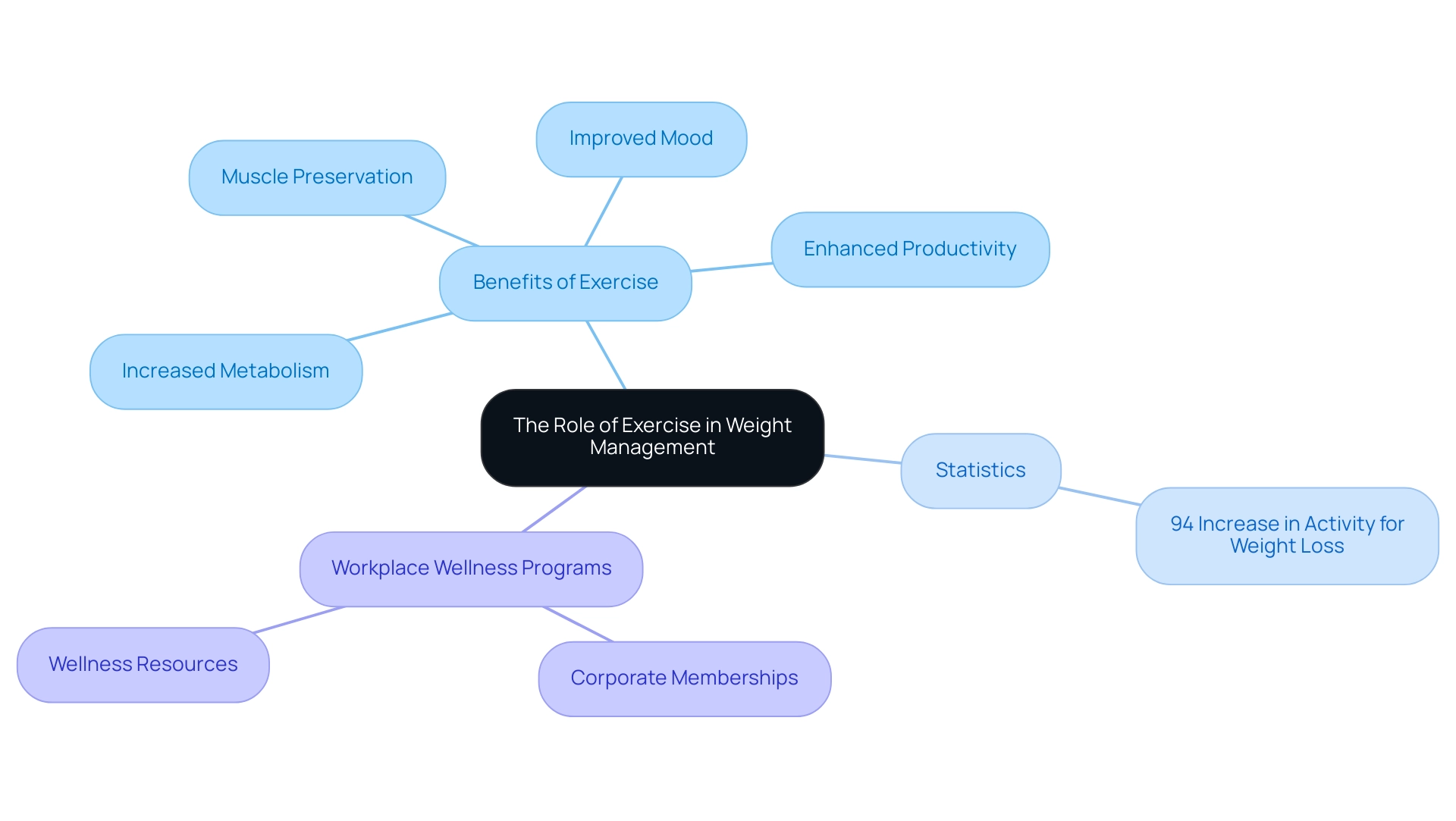
Building a Support System for Weight Loss Success
Creating a robust support network is crucial for achieving effective weight loss for dummies. This support can manifest in various forms:
- Family and Friends: Involving loved ones in your journey to improve fitness provides essential emotional support and accountability, making the process more manageable and enjoyable.
- Professional Guidance: Collaborating with experienced coaches from Corporate Membership who offer weight loss for dummies techniques delivers personalized advice and motivation tailored to specific needs, significantly enhancing the likelihood of success. Tailored coaching not only aids in achieving enduring lifestyle transformations but also empowers individuals to take charge of their health and wellness.
- Support Groups: Engaging in slimming groups or online communities fosters a sense of belonging and shared experience, which can be exceptionally motivating.
Research underscores the importance of strong support networks in shedding excess weight. A Gallup survey revealed that while 43% of U.S. adults perceive themselves as overweight and express a desire to reduce their size, only 27% are actively pursuing this goal. This disparity highlights the need for effective support systems to bridge the gap between intention and action.
Furthermore, data reveal that 41% of adults under 35 desire to shed pounds, contrasted with 59% of individuals aged 35 and above, suggesting a generational shift in perspectives on body management. Psychologists emphasize that social backing plays a crucial role in the success of weight loss for dummies. Individuals who engage with others sharing similar goals are more likely to stay motivated and gain valuable insights from their experiences.
The body transformation industry has acknowledged this trend, offering organized solutions that feature customized diet plans and focused exercise programs, which are essential for cultivating a supportive atmosphere, especially for those seeking weight loss for dummies. Notably, the market size for the reduction industry was valued at USD 159.69 Billion in 2021 and is projected to reach approximately USD 305.30 Billion by 2030, indicating its increasing significance.
In summary, the combination of family, professional guidance from Corporate Membership, and community support not only boosts motivation but also greatly influences success rates in achieving a healthier state, which is essential for weight loss for dummies. By utilizing these resources, individuals can manage their reduction journeys more efficiently and sustainably, ultimately resulting in enhanced health and well-being.
Contact Our Health Coaches Today!
Let’s discuss how we can help you thrive in the modern world while learning from the wisdom of the past.
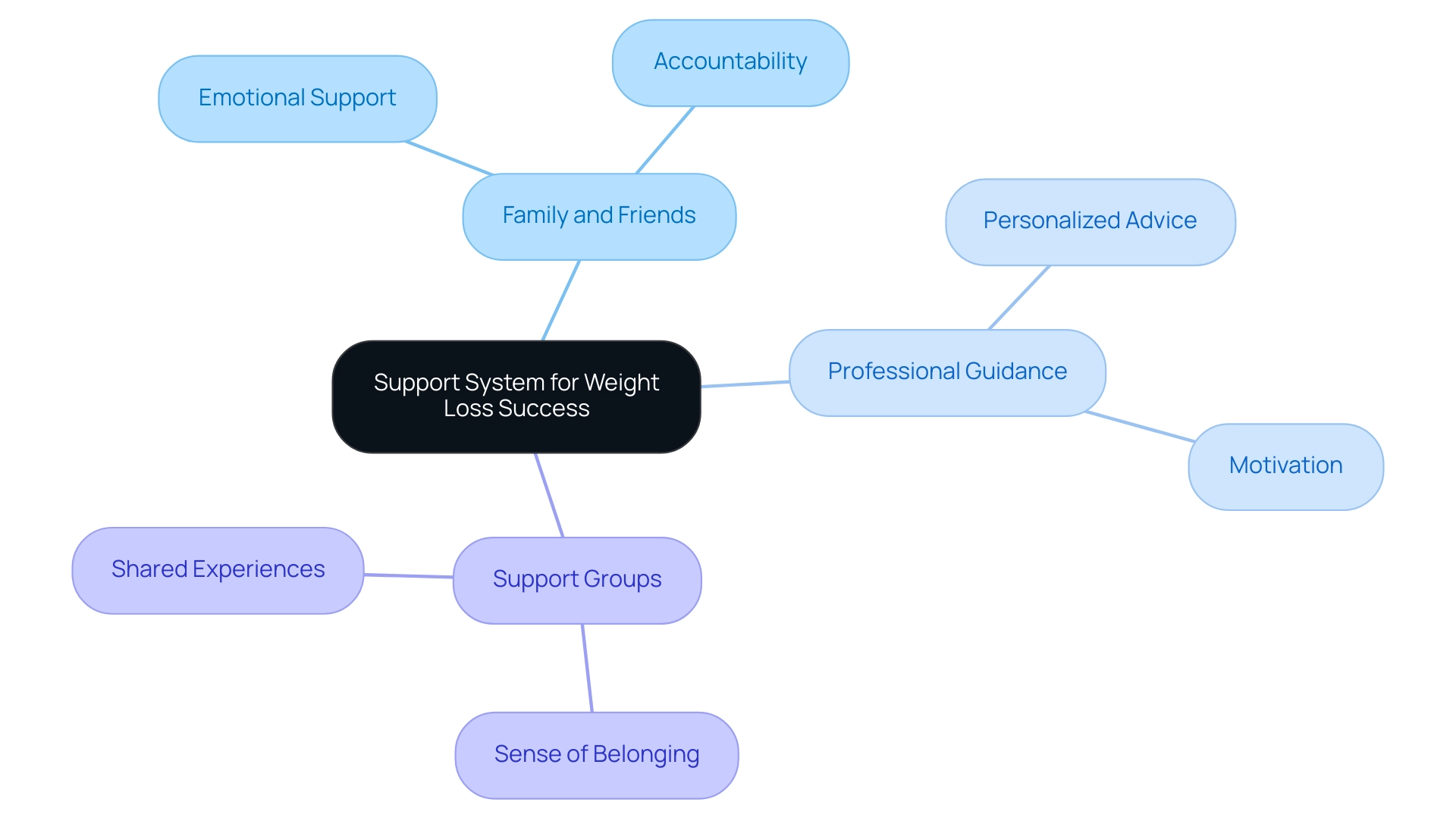
Overcoming Challenges in Your Weight Loss Journey
Weight loss for dummies presents a range of challenges that can impede progress. Among these, the following are particularly prevalent:
- Plateaus: Many individuals experience periods where weight loss stalls, known as weight loss plateaus. Research indicates that these plateaus can persist for eight to twelve weeks, during which the body adjusts to a new set point. A case study titled "Understanding Weight Decline Plateaus" underscores the importance of maintaining healthy habits during this time, as it facilitates adaptation and can lead to continued mass reduction post-plateau. To navigate this phase, it is crucial to reassess dietary habits and elevate physical activity levels.
- Emotional Eating: Stress and emotional triggers can lead to unhealthy eating patterns. Statistics reveal that a significant portion of individuals struggle with emotional eating, which can obstruct progress toward a healthier body. Developing effective coping strategies, such as practicing mindfulness, engaging in physical activity, or seeking support from peers or professionals, can assist in managing these urges and fostering healthier choices.
- Time Constraints: Busy schedules often complicate the prioritization of health and wellness. Nevertheless, planning meals and workouts in advance can ease the integration of healthy habits into daily routines. By allocating specific times for meal preparation and physical activity, individuals can more effectively navigate their time limitations and remain committed to their fitness goals.
Furthermore, research indicates that after seven years, 25% of dieters maintained a reduction of 10% of their initial body mass, highlighting the potential for long-term success in managing body composition. Addressing these challenges proactively can significantly enhance the likelihood of achieving successful reductions and long-term maintenance. By comprehending the dynamics of body reduction plateaus and implementing strategies from weight loss for dummies to overcome emotional eating and time constraints, individuals can cultivate a more resilient approach to their health journey.
As Patrick Castan aptly stated, "This article needs to be shared with anyone on a weight loss journey.
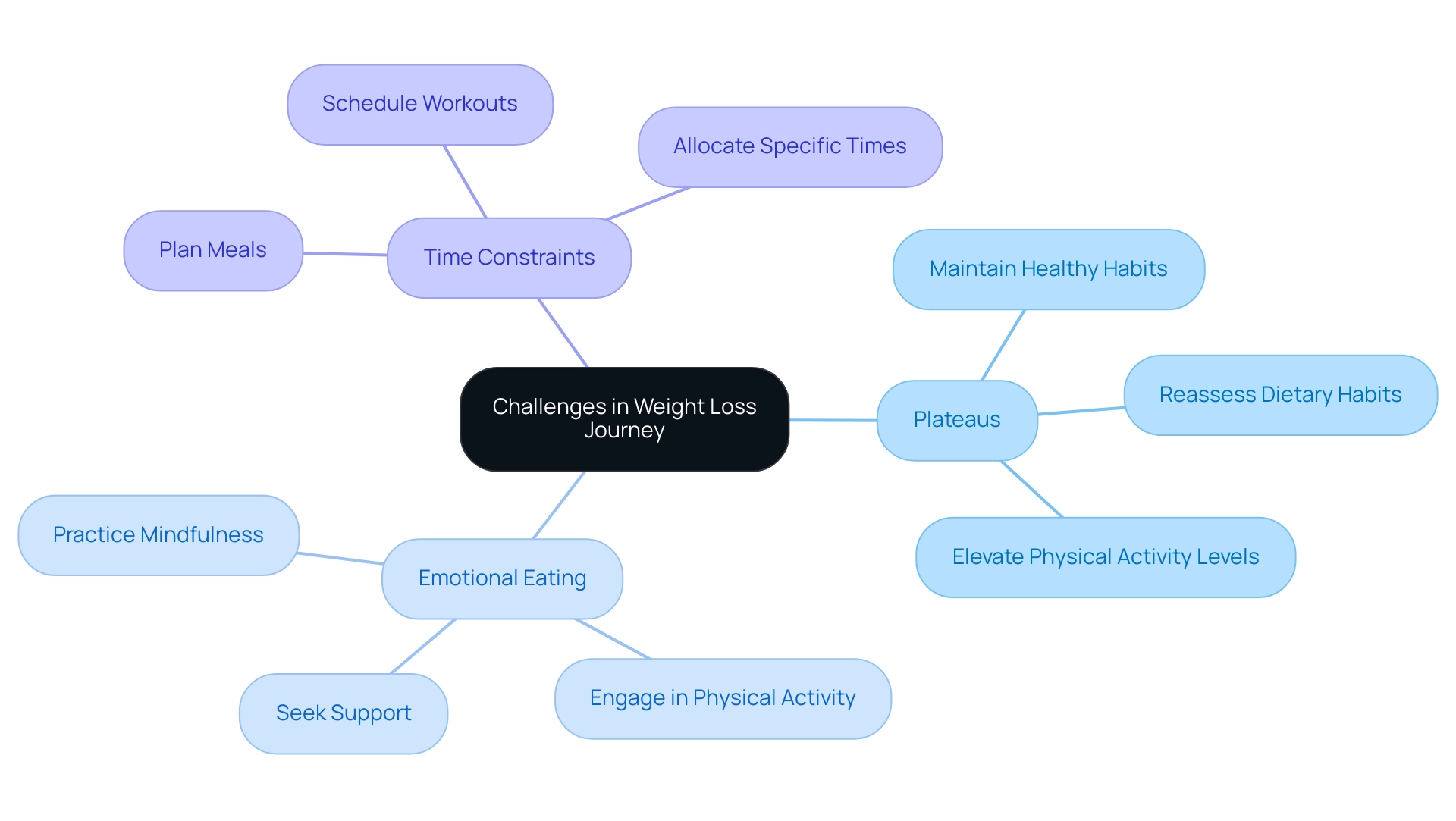
Conclusion
Understanding the multifaceted nature of weight loss is essential for anyone seeking to improve their health and well-being. This journey encompasses a careful balance of dietary choices, physical activity, and emotional support, all of which play a pivotal role in achieving and maintaining a healthy weight. By grasping the principles of energy balance and calorie deficit, individuals can create a sustainable path toward their weight loss goals, bolstered by practical strategies such as:
- Setting realistic targets
- Adopting balanced diets
- Engaging in regular exercise
Moreover, the benefits of weight loss extend far beyond aesthetics, significantly impacting both physical and mental health. Even modest reductions in weight can lead to improved health markers and enhanced self-esteem, highlighting the importance of personalized coaching and support systems. Establishing strong networks of family, friends, and professionals fosters accountability and motivation, which are crucial for navigating the emotional challenges often encountered during this journey.
As individuals face obstacles such as plateaus and emotional eating, proactive strategies and resilience become vital components of successful weight management. By addressing these challenges head-on and utilizing available resources, individuals can cultivate a healthier relationship with food and exercise, ultimately leading to long-lasting improvements in their quality of life.
In conclusion, embarking on a weight loss journey is not merely about losing pounds; it is a transformative process that promotes a healthier lifestyle and overall well-being. By integrating knowledge, support, and practical strategies, individuals can empower themselves to thrive and achieve their health goals, paving the way for a more fulfilling and vibrant life.
Frequently Asked Questions
What is the principle behind weight reduction?
Weight reduction fundamentally hinges on the principle of energy balance, which refers to the relationship between calories consumed and calories burned. To achieve weight loss, individuals must create a calorie deficit by consuming fewer calories than their body expends.
How can individuals create a calorie deficit?
Individuals can create a calorie deficit through dietary modifications, increased physical activity, or a combination of both approaches.
Why is understanding energy balance important in 2025?
Understanding energy balance is critical in 2025 because occupational physical activity has declined by an average of about 142 kcal/day since 1960, highlighting the need for individuals to proactively manage their energy balance.
What are some effective calorie deficit strategies?
Effective calorie deficit strategies include meal planning, portion control, and incorporating more physical activity into daily routines.
How can individuals achieve a sustainable calorie deficit?
A sustainable calorie deficit can be achieved by focusing on nutrient-dense foods that provide satiety without excessive calories.
What are the risks associated with low energy throughput?
Individuals with low energy throughput are at a greater risk for gaining weight, as energy intake aligning closely with energy expenditure helps regulate appetite and maintain a healthy body composition.
What expert opinions exist regarding energy balance and weight loss?
Experts emphasize that teaching individuals, especially children, about energy balance and calorie deficits can help them manage their body mass more effectively.
How does Foresight Health Coaching support weight loss?
Foresight Health Coaching offers a hybrid wellness coaching app that provides personalized workouts, nutrition guidance, and daily programming, empowering users to achieve their wellness goals efficiently.
What are the broader benefits of weight reduction beyond appearance?
Weight reduction is crucial for enhancing overall wellness and vitality, with studies indicating that even a modest reduction of 5-10% can lead to lower blood pressure, improved cholesterol levels, and a decreased likelihood of developing type 2 diabetes.
How does weight loss impact mental health?
Individuals who achieve a decrease in body mass often report enhanced self-esteem and a reduction in symptoms associated with anxiety and depression.
What role does personalized coaching play in weight loss?
Personalized coaching provides tailored support and guidance, empowering individuals to make lasting lifestyle changes and improving motivation levels, particularly in workplace settings.
What advancements are anticipated in obesity management?
Anticipated recommendations from the Lancet Commission on obesity diagnostic standards are expected to enhance understanding of weight reduction's impact on well-being, potentially reshaping clinical strategies and payer coverage.
What is the significance of slight reductions in body mass?
Even slight reductions in body mass can yield extensive physical and mental health benefits, emphasizing the importance of weight management for overall wellness.

